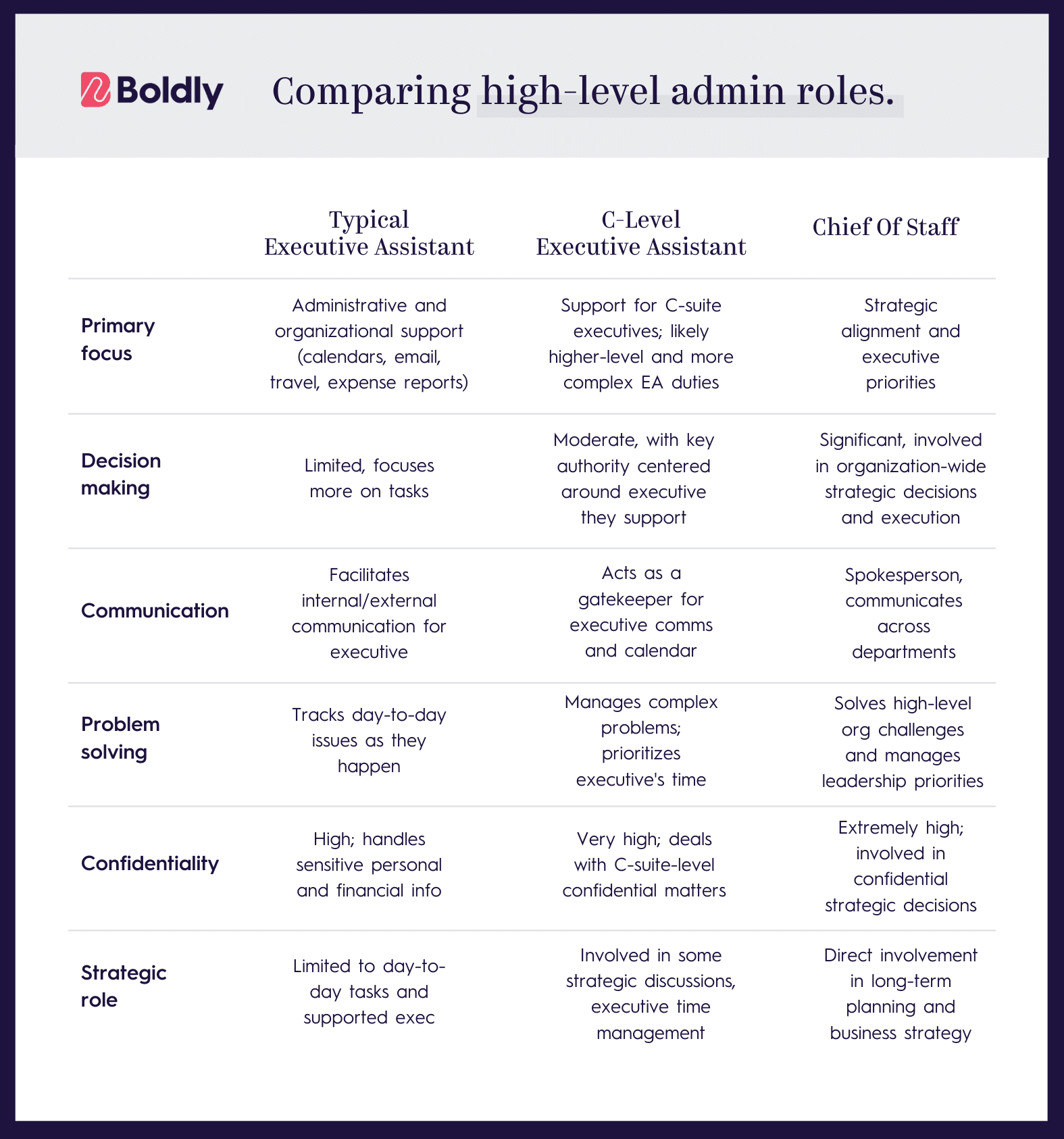Do you need a Chief of Staff? Or is an executive assistant a better fit?
The Chief of Staff and executive assistant roles often intersect, but they are distinct with very different purposes. Knowing these subtle differences between the two means exploring their responsibilities and how their roles might impact your organization.
There are a lot of generalizations in this article. In the real world, things aren’t always so cut and dry — especially if you’re looking at the role of a highly experienced, trusted executive assistant.
Choosing your next hire is always a strategic decision, so let’s compare the two and discover which is right for you.
Understanding The Roles: Chief Of Staff vs. Executive Assistant
Comparing the job descriptions between a Chief of Staff and an executive assistant, they can sound surprisingly similar.
- They both work with executives.
- They both play an important role in keeping the company moving in the right direction.
- They both free up time and relieve some of the pressure an executive or an executive team feels.
- You can hire a fractional Chief of Staff or a fractional executive assistant for just the time you need.
Take a deeper dive, though, and you’ll see the roles are not the same!
What’s The Difference Between A Chief Of Staff And An Executive Assistant?
In general, the Chief of Staff tends to be a higher-level strategic position focused on company-wide initiatives while an executive assistant is more tactical and individual-focused. (Of course, to make matters more confusing, there are many high-level executive assistants out there handling strategic work!)


Chiefs of Staff handle high-level planning while executive assistants handle the daily operational work that makes that planning become a reality.
Key differences between an executive assistant and Chief of Staff:
- They work with different people. A Chief of Staff is an executive-level role that supports the company’s C-suite. An executive assistant can provide support to the C-suite, but may also work with other levels of management.
- They work with different projects and tasks. A Chief of Staff focuses on organizational concerns and enables the big projects and ideas that keep the company on track with their mission and goals. An executive assistant is more in the trenches. They handle administrative tasks and work to make sure the executives are more effective and efficient as they move towards those goals.
- They have different responsibilities. A Chief of Staff is responsible for mapping out or making sure the ship stays on course. It’s a birds-eye view that is most concerned with long-term goals. This includes deciding on new hires, including executive assistants. An executive assistant helps executives power and steer the ship. They make sure it’s smooth sailing by focusing on daily or weekly goals.
To make that happen, different skill sets are required.
Key skills of a Chief of Staff:
- Work and communicate well with people. Collaboration and flexibility are necessary. Working with a variety of people to get them to move in the same direction isn’t easy. A heavy-handed approach is less successful than collaboration, particularly since a Chief of Staff will be working with team members from many departments.
- Have strategic understanding and vision. The ability to see ahead while keeping an eye on what’s happening now is necessary for long-term planning and the decisions that go with it.
- Excel at time management. Meeting deadlines without losing focus is mission-critical for the Chief of Staff. Time management (and the ability to delegate) is necessary.
- Be capable of critical thinking. Because the Chief of Staff is connecting a variety of teams and projects to a few strategic goals, critical thinking skills are necessary. They need to know what to cut, what to add, what to change, and what is related or unrelated to success.
An executive assistant’s skills are a bit different.
Key skills of an executive assistant:
- Be highly organized. They will be managing multiple tasks and lots of information across a variety of platforms, projects, and even executives. They must be organized so that nothing slips through the cracks.
- Excel at time management. Because they are so crucial to the effectiveness and efficiency of executives, being able to manage not only their time but that of their executive is a foundational skill.
- Be able to multitask. Requests, support, and tasks change quickly for an EA. Being able to prioritize those tasks, and handle interruptions that occur, is a necessity.
- Work and communicate well with people. The EA will be working with a variety of people, including team members, managers, and clients. People skills are required, as is the ability to communicate clearly, turning complicated requests and tasks into something easily understood.
- Have excellent attention to detail. An EA is handling schedules, travel, projects, inboxes/emails, documentation, and more. Attention to detail means preventing errors, maintaining privacy, and being prepared with the right information when it’s needed.
See also: What Does An Executive Assistant Do?
In some ways, you can see where there is overlap. And that’s why the question of whether to hire a Chief of Staff vs. an executive assistant is a tough one.
When To Hire A Chief of Staff vs. Executive Assistant
The decision on whether to hire a Chief of Staff or an executive assistant comes down to two basic questions:
- What level of responsibility do I need help with? Are you overwhelmed because of day-to-day admin tasks, or are you falling behind in strategic decisions and organizational practices? Could you meet strategic needs if only you had more time, or do you need help with those top-level responsibilities?
- Is my company large enough for a Chief of Staff? This is a question of complexity, cost, and strategic needs.
Let’s take a closer look at those two questions.
Do You Need Two Of You Or Just More Time?
Both a Chief of Staff and an executive assistant can double your capacity as a leader but in different ways.
The Chief of Staff works alongside your C-suite, helping leaders with decisions and long-term goal-setting in a way that doubles your executive team to create strategic initiatives. An EA supports individuals by freeing up a leader’s time and doing the administrative work that keeps them from devoting their full attention to strategic vision.
If you are capable of goal-setting and strategy but lack the time to devote to it because of admin tasks, an executive assistant is ideal for you. But if you’d like to supplement your own strategic abilities or the executive team with additional high-level contributions, a Chief of Staff would be a better choice.
Consider Company Size, Cost, And Premium Executive Assistants
How complex are your responsibilities as an executive?
If your current role and activity are heavily filled with strategy, decision-making, and managing large projects or teams, having a Chief of Staff can help you a great deal. For larger companies, this is often the case.
If your current role and activity as an executive is more centered on administrative tasks, (complicated schedules, managing correspondence and communication, or managing personal matters for you or team members) an executive assistant is more in line with what you need. By removing those admin tasks from your plate, you will be free to step up in the necessary strategic position that has been lacking.
For those who have budget constraints but could see needing a bit of both, premium executive assistants are an ideal solution.
Because of their high level of experience and skills, premium executive assistants do more than a typical executive assistant, mixing admin support with some elements of a Chief of Staff role.
These highly skilled EAs not only help their executive but also oversee projects or work with the rest of the team to keep them aligned with both project and business goals.
Having both a Chief of Staff and an executive assistant may not be in your budget or a necessary option for some businesses. That’s why a premium executive assistant might be the perfect compromise. Add to it the premium subscription staffing model that’s flexible to fit your budget based on current needs, nearly any sized business can bring on that kind of highly skilled executive assistant.
If you’re not sure which option is the right solution for you—Chief of Staff, executive assistant, or premium executive assistant—we’d love to talk to you and answer any questions you might have.




